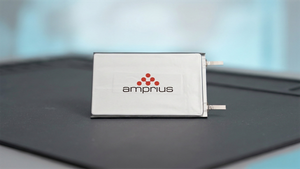Company launches generic equivalent to OTC NARCAN® Nasal Spray
Provides convenient, affordable access to life-saving medicine
Amneal Pharmaceuticals, Inc. (Nasdaq: AMRX) (“Amneal” or the “Company”) today announced the availability of Over the Counter (“OTC”) Naloxone Hydrochloride (Naloxone HCI) Nasal Spray, USP, 4mg, following Abbreviated New Drug Application (“ANDA”) approval from the U.S. Food and Drug Administration (“FDA”). Amneal’s Naloxone HCI Nasal Spray, manufactured in the U.S., is a generic equivalent to OTC NARCAN® HCI Nasal Spray, a medication that is widely used to help treat drug overdose from opioids, including heroin, fentanyl and prescription opioid medications.
“With today’s launch, Amneal is proud to help address this public health emergency by providing naloxone nasal spray at an affordable price and without a prescription. Our business is deeply rooted in a commitment to helping others. By enhancing access to naloxone nasal spray, we hope to get this affordable emergency treatment into the hands of even more people who could potentially save countless families and communities from further heartache and loss,” said Chirag and Chintu Patel, Co-Chief Executive Officers.
More than two-thirds of all drug overdose fatalities in 2022 involved illicit, synthetic opioids like fentanyl, which is the culprit in more deaths under age 50 than any other cause, including heart disease, cancer, homicide, suicide, and other accidents.1,2 According to the Centers for Disease Control and Prevention, in about 46% of overdose deaths, another person is present and has the potential to intervene.3
Amneal Naloxone HCI Nasal Spray is now available. According to IQVIA®, U.S. annual commercial sales for NARCAN® Naloxone HCl Nasal Spray 4mg for the 12 months ended February 2024 were $266 million. In addition, there are significant volumes of the product acquired directly by U.S. states and municipalities. NARCAN® is a registered trademark of Emergent Operations Ireland Limited.
About Naloxone Nasal Spray
Naloxone Hydrochloride (Naloxone HCI) Nasal Spray is designed to rapidly reverse the effects of a life-threatening opioid emergency by binding to opioid receptors and reversing or blocking the effects of opioids. It can restore normal breathing within two to three minutes in a person whose breath has slowed, or even stopped, as a result of an overdose from opioids — including heroin, fentanyl and prescription opioid medications. Naloxone HCI Nasal Spray contains the same active ingredient and dose as NARCAN® Naloxone HCI Nasal Spray, 4 mg. It is easy to carry and can be safely used even if opioids are not present.
When using this product some people may experience symptoms when they wake up, such as shaking, sweating, nausea, or feeling angry. This is to be expected.
About the Opioid Crisis
The opioid epidemic was declared a national public health emergency in 2017 and has continually been renewed by the U.S. Secretary of Health and Human Services.4,5 Ending the epidemic is a top strategic priority of the U.S. government and Congress.6 Since 2000, about one million people in the U.S. have died of drug overdoses, the majority of which were due to opioids.7,8 Drivers of this crisis include the misuse of prescription pain medication and the unwitting use of drugs laced with fentanyl — which is 50 times more potent than heroin and 100 times more potent than morphine.9 In 2022, roughly twice as many people died in the U.S. from opioid-related overdoses than from motor vehicle crashes.10,11
About Amneal
Amneal Pharmaceuticals, Inc. (Nasdaq: AMRX), headquartered in Bridgewater, NJ, is a global pharmaceuticals company. We make healthy possible through the development, manufacturing, and distribution of a diverse portfolio of over 270 pharmaceutical products, primarily within the United States. In its Generics segment, the Company is expanding across a broad range of complex product categories and therapeutic areas, including injectables and biosimilars. In its Specialty segment, Amneal has a growing portfolio of branded pharmaceuticals focused primarily on central nervous system and endocrine disorders, with a pipeline focused on unmet needs. Through its AvKARE segment, the Company is a distributor of pharmaceuticals and other products for the U.S. federal government, retail, and institutional markets. For more information, please visit www.amneal.com.
Cautionary Statement on Forward-Looking Statements
Certain statements contained herein, regarding matters that are not historical facts, may be forward-looking statements (as defined in the U.S. Private Securities Litigation Reform Act of 1995). Such forward-looking statements include statements regarding management’s intentions, plans, beliefs, expectations, financial results, or forecasts for the future, including among other things: discussions of future operations; expected or estimated operating results and financial performance; and statements regarding our positioning, including our ability to drive sustainable long-term growth, and other non-historical statements. Words such as “plans,” “expects,” “will,” “anticipates,” “estimates,” and similar words, or the negatives thereof, are intended to identify estimates and forward-looking statements.
The reader is cautioned not to rely on these forward-looking statements. These forward-looking statements are based on current expectations of future events, including with respect to future market conditions, company performance and financial results, operational investments, business prospects, new strategies and growth initiatives, the competitive environment, and other events. If the underlying assumptions prove inaccurate or known or unknown risks or uncertainties materialize, actual results could vary materially from the expectations and projections of the Company.
Such risks and uncertainties include, but are not limited to: our ability to successfully develop, license, acquire and commercialize new products on a timely basis; the competition we face in the pharmaceutical industry from brand and generic drug product companies, and the impact of that competition on our ability to set prices; our ability to obtain exclusive marketing rights for our products; our revenues are derived from the sales of a limited number of products, a substantial portion of which are through a limited number of customers; the impact of a prolonged business interruption within our supply chain; the continuing trend of consolidation of certain customer groups; our dependence on third-party suppliers and distributors for raw materials for our products and certain finished goods; legal, regulatory and legislative efforts by our brand competitors to deter competition from our generic alternatives; our dependence on information technology systems and infrastructure and the potential for cybersecurity incidents; our ability to attract, hire and retain highly skilled personnel; risks related to federal regulation of arrangements between manufacturers of branded and generic products; our reliance on certain licenses to proprietary technologies from time to time; the significant amount of resources we expend on research and development; the risk of claims brought against us by third parties; risks related to changes in the regulatory environment, including U.S. federal and state laws related to healthcare fraud abuse and health information privacy and security and changes in such laws; changes to Food and Drug Administration product approval requirements; the impact of healthcare reform and changes in coverage and reimbursement levels by governmental authorities and other third-party payers; our dependence on third-party agreements for a portion of our product offerings; our substantial amount of indebtedness and our ability to generate sufficient cash to service our indebtedness in the future, and the impact of interest rate fluctuations on such indebtedness; our potential expansion into additional international markets subjecting us to increased regulatory, economic, social and political uncertainties, including recent events affecting the financial services industry; our ability to identify, make and integrate acquisitions or investments in complementary businesses and products on advantageous terms; the impact of global economic, political or other catastrophic events; our obligations under a tax receivable agreement may be significant; and the high concentration of ownership of our class A common stock and the fact that we are controlled by the Amneal Group. The forward-looking statements contained herein are also subject generally to other risks and uncertainties that are described from time to time in the Company’s filings with the Securities and Exchange Commission, including under Item 1A, “Risk Factors” in the Company’s most recent Annual Report on Form 10-K and in its subsequent reports on Forms 10-Q and 8-K. Investors are cautioned not to place undue reliance on any such forward-looking statements, which speak only as of the date they are made. Forward-looking statements included herein speak only as of the date hereof and we undertake no obligation to revise or update such statements to reflect the occurrence of events or circumstances after the date hereof.
- Mbabazi Kariisa, PhD; Julie O’Donnell, PhD; Sagar Kumar, MPH; Christine L. Mattson, PhD; Bruce A. Goldberger, PhD. (2023). “Illicitly Manufactured Fentanyl–Involved Overdose Deaths with Detected Xylazine — United States, January 2019–June 2022.” Morbidity and Mortality Weekly Report. Weekly / June 30, 2023 / 72(26);721–727. https://www.cdc.gov/mmwr/volumes/72/wr/mm7226a4.htm#:~:text=In%202022%2C%20provisional%20data%20indicated,(IMFs)%20(1).
- United States Drug Enforcement Administration. (2024). Fentanyl Awareness. [Fact Sheet]. https://www.dea.gov/fentanylawareness.
- Centers for Disease Control and Prevention. Drug Overdose. SUDORS Dashboard: Fatal Overdose Data. (2022). Potential opportunities for intervention in 2021. https://www.cdc.gov/drugoverdose/fatal/dashboard/index.html.
- U.S. Department of Health and Human Services. (2017). Determination That a Public Health Emergency Exists. https://aspr.hhs.gov/legal/PHE/Pages/opioids.aspx.
- U.S. Department of Health and Human Services. (2023). Declarations of a Public Health Emergency. https://aspr.hhs.gov/legal/PHE/Pages/default.aspx.
- The White House. (2022). President Biden Releases National Drug Control Strategy to Save Lives, Expand Treatment, and Disrupt Trafficking. https://www.whitehouse.gov/ondcp/briefing-room/2022/04/21/president-biden-releases-national-drug-control-strategy-to-save-lives-expand-treatment-and-disrupt-trafficking/.
- Council on Foreign Relations. (2023). Fentanyl and the U.S. Opioid Epidemic. [Backgrounder]. https://www.cfr.org/backgrounder/fentanyl-and-us-opioid-epidemic.
- Centers for Disease Control and Prevention. (2022). Drug Overdose. Death Rate Maps and Graphs. https://www.cdc.gov/drugoverdose/deaths/index.html.
- American Psychiatric Association. (2022) Opioid Use Disorder. [Backgrounder]. https://www.psychiatry.org/patients-families/opioid-use-disorder.
- Centers for Disease Control and Prevention. (2023). Provisional Data Shows U.S. Drug Overdose Deaths Top 100,000 in 2022. https://blogs.cdc.gov/nchs/2023/05/18/7365/#:~:text=The%20only%20state%20in%20which,82%2C310%20in%20the%20previous%20year.
- United States Department of Transportation. (2023) NHTSA Estimates for 2022 Show Roadway Fatalities Remain Flat After Two Years of Dramatic Increases. [Press Release]. https://www.nhtsa.gov/press-releases/traffic-crash-death-estimates-2022#:~:text=The%20National%20Highway%20Traffic%20Safety,42%2C939%20fatalities%20reported%20for%202021.
View source version on businesswire.com: https://www.businesswire.com/news/home/20240424236083/en/
Contacts
Anthony DiMeo
VP, Investor Relations & Media
anthony.dimeo@amneal.com





